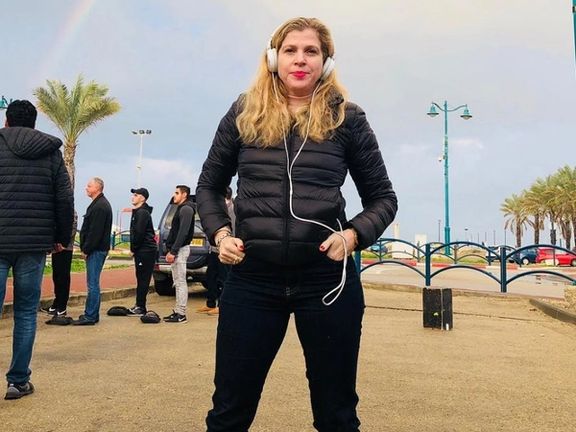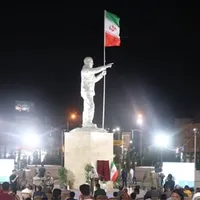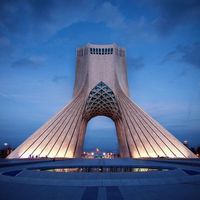Iran’s Supreme Leader Calls Voting A Duty Amid Loyalist Purge
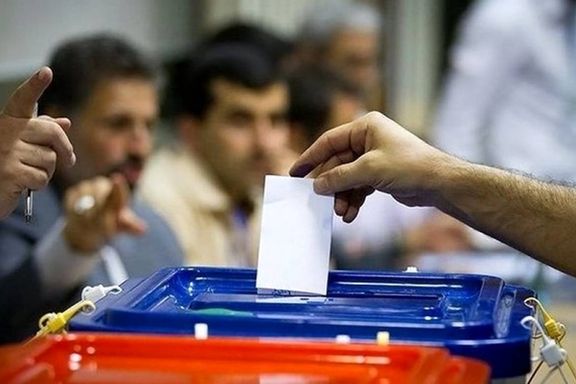
Iranian Supreme Leader Ali Khamenei urged citizens to “fulfill their duty” to participate in the upcoming elections amid a purge of regime loyalists.

Iranian Supreme Leader Ali Khamenei urged citizens to “fulfill their duty” to participate in the upcoming elections amid a purge of regime loyalists.
Addressing concerns about efforts to discourage elections, Khamenei addressed supporters on Wednesday, saying, "Some individuals do not wish for the elections to take place, and they strive to make the people despaired, erode their trust, and pretend that elections are futile and inconsequential."
He called for actions against those attempting to “weaken public engagement in the country's administration”, which comes amid continued mass dissent in the wake of the 2022 uprising.
He claimed a "hostile movement" is seeking to undermine the electoral process, though it is estimated as little as 15 percent of voters will participate given the current with the status quo.
The ongoing purification campaign led by hardliners within the Paydari Party initiated earlier in the year to consolidate political power, resulted in dismissals and bans for numerous university professors, teachers, and artists.
The dominance of hardliners began in 2020 when the Guardian Council disqualified hundreds of individuals from running for parliament. In the 2021 presidential elections, serious contenders were barred, paving the way for Ebrahim Raisi's presidency.
As the March 1 elections approach, the absence of reformist and moderate groups due to disqualifications raises concerns about low voter turnout. Reports suggest that ultraconservatives may even welcome a low turnout.
While Khamenei expresses a desire for high voter turnout, the actions of his followers, particularly the hardliners, indicate a lack of intention to provide a fair chance to their rivals, the Reformists.
Reformist groups, largely excluded in the previous two elections, face challenges in mobilizing voters as many of their candidates have already been disqualified.
The Interior Ministry's discretionary disqualifications, coupled with the Guardian Council's vetting powers, further limit the scope for a diverse and competitive electoral landscape.
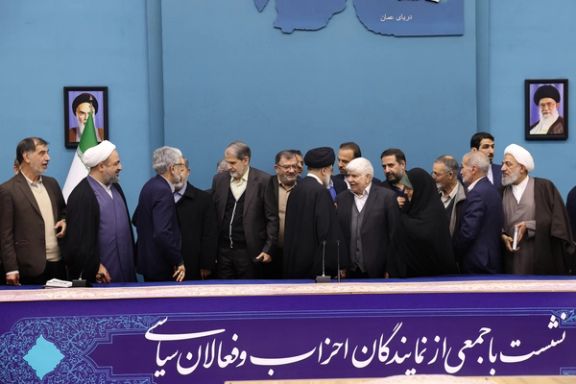
Iranian President Ebrahim Raisi on Monday called a meeting with some 50 politicians loyal to the regime, amid sharp controversy over upcoming parliamentary elections.
The meeting, which was the first of its kind since Raisi took office as Iran's President in 2021, was shunned by some Reformists who saw his maneuver as a move to distract the nation from the realities on the ground. However, some of them appreciated the opportunity to meet face to face with Raisi and convey their concerns ahead of the March 1 parliamentary elections.
Hardliners using the regime’s undemocratic candidate vetting scheme has already disqualified most Reformists and moderates from running in the election. This has diminished the already slim chance of having a large turnout by voters, who are uncertain that elections could lead to meaningful policy changes under Supreme Leader Ali Khamenei.
Iranian social media users and journalists also reacted negatively to Raisi’s apparent willingness to engage with insider political groups. Mostafa Faghihi, the editor of Entekhab News wrote in a tweeted that Raisi has clearly aligned himself with the hardliner Paydari group. "In your opinion, why should Raisi sit between the chairman of the central council of Paydari Party and the Interior Minister [who is also close to Paydari]? Interestingly, Raisi has said recently that his government has no candidate in the parliamentary elections. But it seems that he has done away with all reservations, and we should clearly see the indications of Paydari's influence in the government."
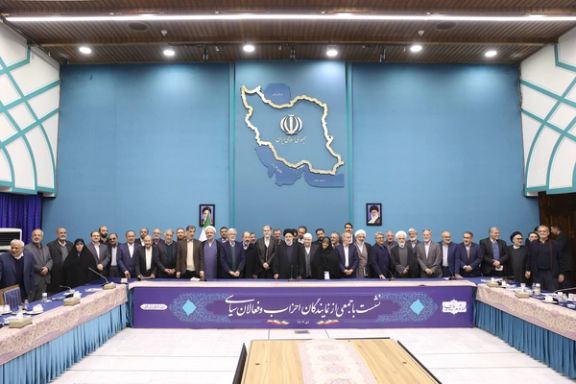
Another user who posted several photos of the meeting, wrote: "Did you ever see such a scene in the Rouhani administration?" And Iranian journalist Ehsan Bodaghi wrote: "This is not even a show of a political agreement. The minimum requirement for an agreement is holding free and fair elections. In that case, you do not need these pictures to prove that all political groups will take part in the elections."
The 150-minute-long meeting was attended by politicians from the left and right wings, but most of the 25 political figures who spoke or asked questions were from the reform camp. Mohammad Ali Abtahi, the former chief of staff of former President Mohammad Khatami wrote on Instagram: "I told Raisi he should acknowledge that the people are sulking with the government. I also told him that even all of us try to encourage the people to vote, our advice is not going to be effective and will not change social realities."
Abtahi quoted Raisi as having said at the meeting that in his opinion all candidates who have registered should be allowed to run.
Opponents of the regime and true dissidents are already barred from political participation. Their place is usually in the courts, prisons or exile.
Meanwhile, Abtahi wrote that during the meeting Sadeq Mahsouli the leader of the Paydari Party said that 2009 Presidential election was the best election that was ever held in Iran. That was the disputed election that brought populist Mahmoud Ahmadinejad to power for a second term and led to months of protests all over Iran. Abtahi added that former government spokesman, reformist Ali Rabiei harshly responded to Mahsouli who had called the protests "sedition."
Abtahi said that during his speech, he suggested to Raisi to change his restrictive policy about social media and allow the parliament to have a say about key matters, such as foreign policy.
Meanwhile, according to Etemad online, reformist activist Javad Emam said in the meeting that organizing the meeting was meant to distract attention from the political realities in the Iranian society. "Without free, fair and competitive elections, such meetings are nothing more than shows, " Emam said. He added that the meeting will not have any impact on the elections. It was only meant to justify the government's policy of barring candidates. Such a meeting should have taken place before changing the provisions of the election law and barring many candidates, he said.
Emam further accused Raisi and his government of disappointing the people and causing young Iranians to lose faith in the electoral process. In conclusion, Emam called on the government to abolish the vetting process and respect the people's right to choose their representatives.
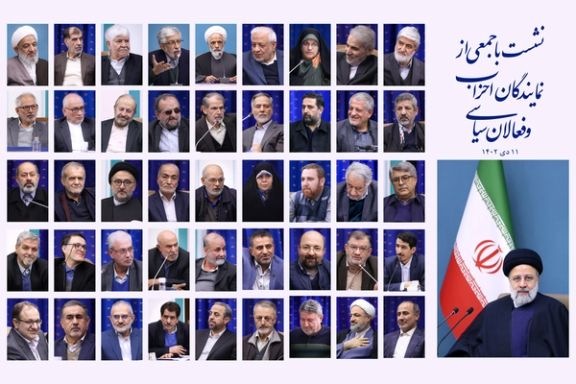
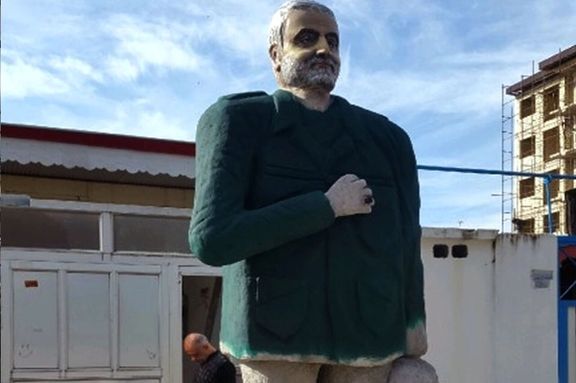
An Iranian doctor and university professor from the city of Bojnurd in the northeast was detained after posting a picture of "cutlet" on the night of the death of IRGC commander Razi Mousavi.
The action was part of a broader trend where Iranian regime opponents observed the anniversary of former IRGC commander Qassem Soleimani's killing as "Cutlet Day" on various social media platforms, referring to his mutilation in a US drone strike in 2020.
Iranian regime opponents and activists took to social media this month sending "Cutlet Day" viral, drawing a parallel to a popular Iranian dish consisting of ground beef and potatoes.
The prosecutor of Bojnourd confirmed the arrest, stating that "insulting the martyrs is considered an insult to sanctities," the two top military men deified by the regime since their deaths. Like Soleimani, Mousavi, reportedly killed in an Israeli airstrike in Syria, played a pivotal role in fortifying Iran's proxy forces in the region.
The arrest aligns with a pattern of Iranian authorities cracking down on dissent. Earlier in January, a prominent chef and Instagram influencer, Navab Ebrahimi, faced detention for sharing a Persian cutlet recipe on the anniversary of Soleimani's death. Ebrahimi was released on bail after a few days, though the specific charges against him remained unclear.
The Iranian government's intensified response to dissent is evident, particularly in the aftermath of the September 2022 death in police custody of 22-year-old Mahsa Amini. Amini was arrested for allegedly improperly wearing a headscarf, fueling nationwide anger and prompting increased measures to suppress signs of dissent across the country amid mass protests.
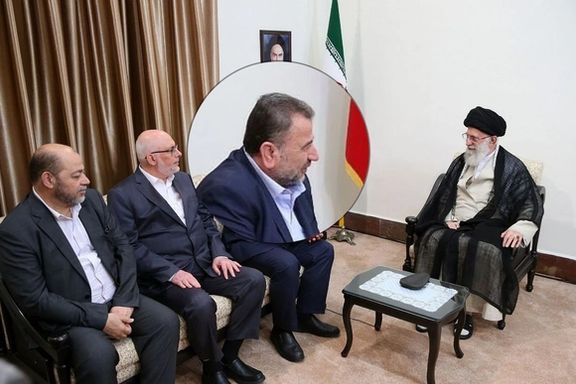
Iran's government, military and hardliners have so far reacted cautiously to the Israeli assassination of a senior Hamas official, Saleh al-Arouri, in Lebanon.
A drone attacked Hamas’s office in the southern suburbs of Beirut, where Arouri had a meeting. Several others attending were also killed.
Iran's Foreign Ministry spokesman condemned Israel's "despicable" killing of al-Arouri and two other military commanders, saying the killings will further "motivate" the region to fight Israel. But Iranian government websites on Wednesday had little to say about the major event, as the regime marks the fourth anniversary of Qasem Soleimani's death. On January 3, 2020, the all-powerful IRGC regional operative was killed by a US drone strike in Baghdad.
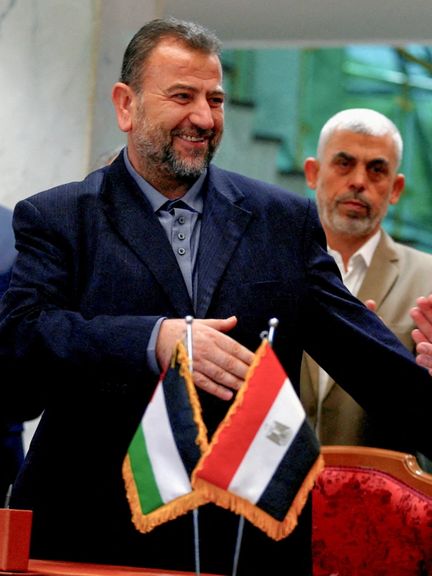
Curiously, the low-key reaction to al-Arouri's targeted killing came despite the fact that he was a key figure in Hamas’s relationship with the regime in Iran. Hezbollah issued a statement, however, calling the killing a “serious assault on Lebanon” that would be punished. “The resistance has its finger on the trigger,” the statement read.
Hezbollah leader Sayyed Hassan Nasrallah had previously warned Israel that his group would retaliate against any attempt on the lives of Palestinian (or other allied) officials in Lebanon.
A spokesperson for the Israeli military said it was “in a very high state of readiness” and “highly prepared for any scenario, alluding to a potential strike from Hezbollah.
This was the first Israeli attack on Beirut since 2006.
The drone attack is a major escalation after nearly three months of conflict on Israel’s northern border with Lebanon, where Hezbollah forces and the Israeli troops have been exchanging fire almost daily ever since Hamas rampaged Israel on October 7, 2023.
Israel vowed to kill “all” Hamas leaders after that attack. Saleh Al-Arouri is the most senior Hamas official to have been killed since thena.
Arouri was one of the founders of Hamas’s military wing and in charge of the group in the West Bank. He had spent nearly 18 years in Israeli prisons since the early 1990s. Living in Lebanon since 2018, he was known to be close both to Hezabollah and to Iran.
Images of his recent meeting with Ali Khamenei surfaced after the news of his killing. Almayadeen published excerpts of a recent interview with him, where he said getting killed would be “the ultimate victory.”
Arouri’s killing raises fears that Hezbollah would be drawn into the war. The group, supported financially and militarily by Iran, is widely believed to be the most powerful non-state actor in the region –far more powerful than Hamas, certainly.
There were reports last week that Israeli officials and generals were considering a shift from high-intensity operations to more “surgical” strikes on high-ranking Hamas officials.
The Institute for the Study of War (ISW), based in Washington D.C. and "focused on US national security", reported Tuesday eveningthat the Israeli army has withdrawn “five brigades” from Gaza Strip to transition from “major combat operations” to “targeted raids,” and establishing a security buffer zone within the Gaza Strip.
“Israeli forces have degraded several Hamas units and rendered others combat ineffective, particularly in the northern Gaza strip,” ISW posted on X. “But Hamas’ military forces are neither defeated nor destroyed at this time.”
Arouri’s assassination may prove to be a fatal blow to any talks about hostage release, as he is said to have been influential in the negotiations earlier.
Lebanon’s prime minister, Najib Mikati, condemned the attack as a “new Israeli crime intended to spur a new phase of conflict.”

ABout 150 political and civil activists in Iran have joined forces to condemn what they denounce as a "new wave of Baha'i suppression."
Latest reports reveal the Islamic Republic's security forces seizing extensive land, totaling tens of hectares, from Baha'i citizens in the northern region, notably in Ahmadabad village near Sari. The lands have been in possession of the Baha'i community for over seven decades.
The land seizure unfolds as part of broader systematic efforts by the Iranian government to suppress the Baha'i religious minority, including property confiscations in Semnan and demolitions of Baha'i homes in Roshankooh village within the past year.
The joint statement strongly opposes the policies of the Islamic Republic and provides a concise history of political and social pressures on the Baha'i minority over the past century and a half. It declares that the "comprehensive deprivation of Baha'is from their civil rights under the ruling of religious despotism and theocratic system has reached its peak."
The statement details various oppressive actions against the Baha'i community, emphasizing the brutality faced, and condemns the recent surge in arrests targeting Baha'is. The activists denounce the "brutal and inhumane" behavior of the Islamic Republic toward the religious minority. They urge all social and political activists to voice support for Baha'i citizens and demand the cessation of the religious government, advocating for the establishment of a democratic and secular government.
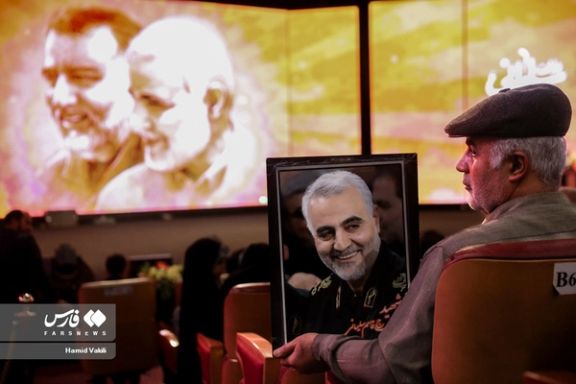
An Israeli drone killed top Hamas leader Saleh Al-Arouri Tuesday, on the eve of the fourth anniversary of the US killing of IRGC commander Qasem Soleimani.
Some hardline commentators in Iran are suggesting that the timing has been deliberate and all the more insulting. Al-Arouri was killed just as state-media in Iran broadcast images of mourners paying homage to Soleimani in his hometown of Kerman.
Iran’s permanent mission to the United Nations registered another protest on Tuesday, claiming a “legitimate right under international law to pursue legal proceedings to hold accountable and bring to justice perpetrators” of Soleimani’s killing.
Whether or not the timing was deliberate, it’s only natural that Soleimani’s name would be invoked in any such attack, since he played a crucial, perhaps unique, role in strengthening the multiplicity of armed groups which the Islamic Republic calls the Axis of Resistance –and many in the West call Iran proxies.
In more than two decades at the head of the IRGC’s Quds forces, Soleimani managed to create a loose but effective coalition of forces spanning from Yemen to Lebanon, all with domestic interest but united in their enmity towards Israel and the US.
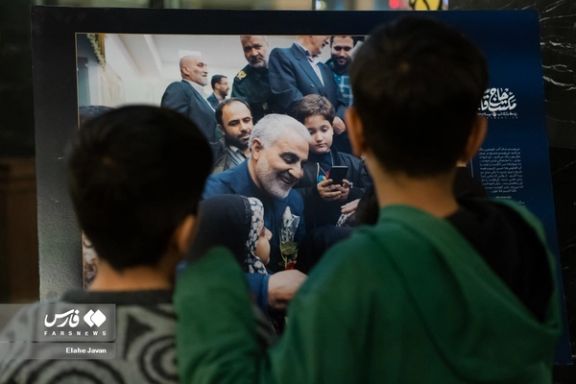
In the past few days, state-affiliated media in Iran have published many accounts of Soleimani’s “achievements” in the region and beyond, including a lesser-known story of his role in the Bosnian war in the early 1990s.
In an interview with the IRGC-affiliated Tasnim News, former commander of IRGC forces in Syria Mohammad Jafar Asadi described how Soleimani got involved in a European civil war almost immediately after taking charge of the Quds Force.
“It was almost 1am. I was home. The phone rang. I picked up and it was Qasem [Soleimani]... He said I need these weapons. Write them down. I said, now? He said, "No questions, start writing.”
The weapons were delivered early in the morning and shipped to the Balkans, where Iran was supporting Muslim Bosnians.
Asadi then went on to talk about Soleimani’s role in Syria, claiming that he was the one to convince Vladimir Putin to commit the Russian air force in support of the Syrian dictator Bashar Assad.
Russia and Iran did indeed become ‘strategic’ allies in Syria, propping up the Assad regime in a brutal campaign that killed at least 300,000 and brought total destruction to large parts of the country.
Not much of a surprise that some Syrians celebrated Soleimani's killing four years ago to the day.
Soleimani’s name once more became ubiquitous in Iran’s state-affiliated media after Hamas’ rampage of Israel on October 7, with many officials hailing the attack as an ultimate fruition of his efforts, while at the same time denying any direct involvement in the planning or execution of the operation.
In a long piece in the hardline paper Farhikhtegan, it’s claimed that Soleimani had a crucial hand in getting weapons into Gaza and even the West Bank –claims that are hard to verify or reject.
Moreover, Farhikhtegan revealed how Soleimani emphasized on domestic production of weapons in Gaza and Yemen –where Houthis have become a major headache, disrupting the flow of vessels in the Red Sea to and from the Suez Canal.
“He believed we should not limit our weapons support program to exports and teach them fishing so that they can make their own weapons… A considerable part of the Resistance’s weapons are manufactured in underground factories of Gaza. And it’s the same thing in Yemen.”
The targeted killing of Hamas leader Al-Arouri in Beirut could be the trigger many observers feared would draw in Hezbollah into a wider war with Israel. If that were to happen, if the Middle East were to be engulfed in a major war, Soleimani’s image would almost certainly be invoked again by all those involved, the outcome of that war notwithstanding.
